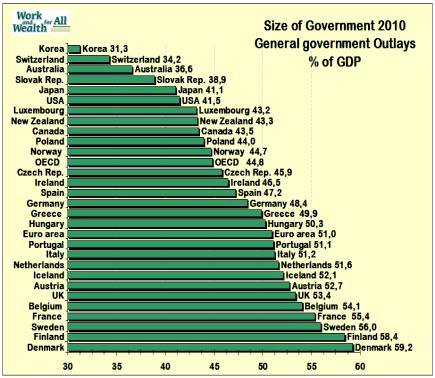
A comparison: how does size of the US government compare to others?
In the continuing ideological battle over the size and role of government, those who claim incremental victories are those who succeed in altering the scope and focus of the national dialog. The past months have been tumultuous, marked by a flurry of such momentum shifts. After the enthusiasm generated by Obama's "Sputnik moment" in a State of the Union address focused on "winning the future," the Republican party effectively redefined our collective focus as making deep deficit reductions through cuts. And following a renewed international relations focus in the wake of the death of Osama bin Laden, we have once again returned to the budgetary bargaining table. The Ryan plan, the looming debt ceiling, oil/agriculltural subsidies, and Medicare - all are conspicuous objects of media attention in the evolving battleground.So who will turn out the victor? As we can see, the ever-changing nature of political conversation makes confidently predicting an outcome impossible. Although mements hyped by pundits may seem deeply significant at the moment (The upset in New York's 26th Congressional District, for instance), they are simply small engagements in a much larger-scale, longer-term campaign. This being said, it's hard not to notice that the extremist portions of the small government movement are losing ground at the moment. As improbable as it may seem considering the tone of debate over past months, Americans value the welfare state and its social safety net. They do not value corporate giveaways. Over 70% of citizens oppose both oil subsidies and cuts to Social Security, while around 55% oppose tax cuts for the rich. As much buzz as the Tea Party has garnered, it has never represented mainstream economic views, at least none beyond a generic, universal desire to reduce the national debt.
Put in a historical context, the recent town hall meeting fiascoes for Republican freshmen in the House have demonstrated two things. The first is that public opinion is malleable, its portrayal in the media influenced by whichever small group of activists feels motivated to speak out at the moment. The second is that Americans are conservative - in the sense that they want to protect programs that work and avoid fundamental changes to the way they work. Contrary to what Paul Ryan would have America believe, sometimes the vilified 'status quo' is a good thing. Voters understand this. Meanwhile, fringe movements are pulling the Republican away from this conservative attitude and towards a radical views. As long as the GOP keeps dilly-dallying in the realm of (in the words of Newt Gingrich) "right-wing social engineering," the 28% of Americans who approve of the House of Representatives is a number that will keep falling. So for now, small government proponents aren't winning. Instead, the rarely-discussed advocates for medium-size government continue to hold firm; perhaps we'll see more of them come January 2013.







